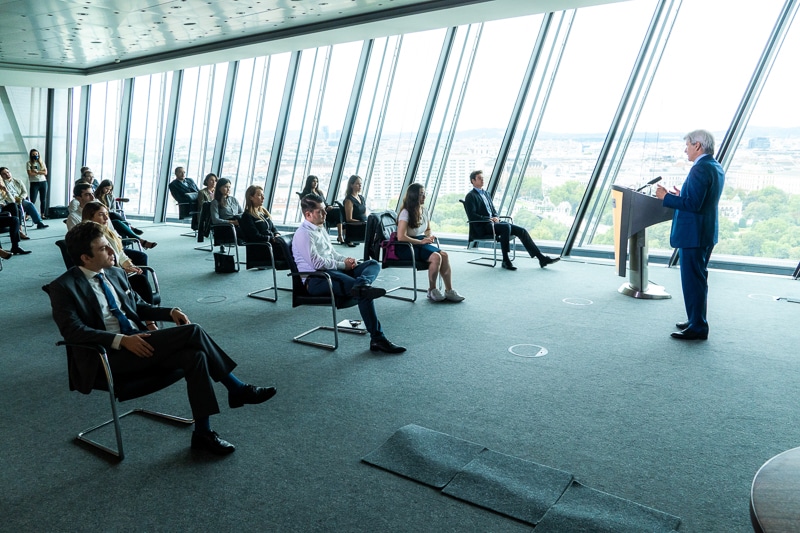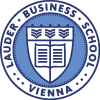On August 31, Lauder Business School students participated in the panel discussion “Resetting the agenda: Boosting the CEE economy post COVID-19” within the frame of the European Forum Alpbach 2020 supported by the Raiffeisen Bank International (RBI). Challenged and united by the same opponent, COVID-19, leaders of the financial and governmental institutions discussed recovery plans for life after the pandemic as well as redefining their economies on sustainable and digitally fit grounds.
Panel participants were EU leaders from the political and financial sector, the Chancellor of the Republic of Austria Sebastian Kurz, Managing Director of the International Monetary Fund (IMF) Kristalina Georgieva, and CEO of Raiffeisen Bank International Johann Strobl. The event took place in a hybrid setting (offline and online) at the RBI headquarters in Vienna.
Firstly, the participants discussed the rapid transition and adaption of the workflow due to the outbreak. The RBI CEO Johann Strobl praised the overnight change to online working and maintaining excellent contact with all their customers, mentioning that, “I was surprised at how well our employees can work from home and I am happy that our clients could focus on their personal concerns with their bank supporting them as usual.” He also applauded the government’s fast response with support packages and the IMF aid.
Next, the Chancellor of the Republic of Austria Sebastian Kurz saw the recovery of the CEE region through the digitalization as the driver of economic and sustainable growth. In his opinion the leadership role of Austria after the crisis will not change much, as Austria will remain the bridge between Eastern and Western Europe. Being the biggest foreign direct investor in Slovenia and Croatia and home to more than 200 companies from the CEE, Austria will keep its leader position in the region also after the crisis.
In continuation, Managing Director of the IMF Kristalina Georgieva reflected on their work thus far and gave insight into the future direction. In the first stage of the outbreak the guiding rule was “Do as much as you can, and then do a little bit more” with the IMF trying to support countries in medical need as quickly as possible. Now coming to the 2nd stage and with the new slogan “Spend as much as needed, but keep the receipt”, the call goes to all the countries to be mindful about establishing good policies and selective in who they support. Well-designed programs for recovery need to make sure that not only the digital industry comes out as a winner, but that also new jobs in the green economy are created.
Ms Georgieva (IMF) then continued by stating that: “Recovery is coming, but it will be partial and uneven. We need good fiscal discipline and resilient economy. The hardest economic crisis hits countries with weak policies and not enough transparency. Transparency and accountability remain the main success factors for recovery.”
The panel agreed that this crisis can be seen as an opportunity for change and tighter collaboration in the CEE region. If CEE as a region would establish leadership beyond the region, Europe would be a leader that grows faster than domestic markets alone. Quality in education and R & D are the key to growth and strengthening the CEE economy, and in that respect Europe cannot afford to lack behind Asia and the United States.
The discussion finished with a personal welcome of our students by Mr. Strobl, followed by consulting about career opportunities at RBI with the Recruiting Manager. To find out more about available vacancies please visit RBI career portal.




Recent Comments